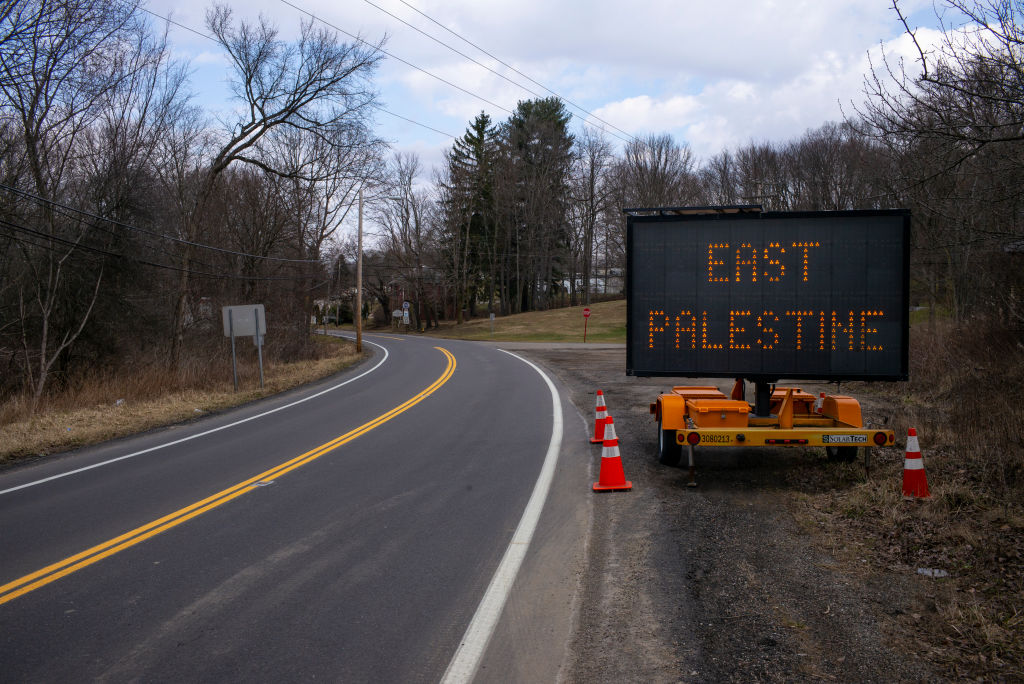More than two weeks after a train derailment caused an environmental disaster in their town, residents of East Palestine, Ohio, say their skin is crawling at the touch of home.
But it’s not just the rashes, headaches, and runny noses that have become rampant in East Palestine, Ohio, in the toxic aftermath of the derailment.
It’s the fear of what might come next.
“I don’t want to live in a ‘what-if’ or ‘maybe’ kind of life. I don’t want to fear in the five to 10 years that me or my children are going to get sick or my grandchildren will never have their own children or be sick and never get to live life. That scares me,” resident Shelby Wagner said, according to WXIX-TV, a Newport, Kentucky, station that broadcasts in the Cincinnati metropolitan area.
Reflecting her distrust of the government’s response to the disaster, she said, “I’m afraid we’re going to be stuck here, and then we’re kind of like their little lab rats. Like, ‘maybe you might get cancer, five or 10 years down the road, you might not, but you might,’ is what their saying. That’s my fear.”
Fear has stalked the town since the Feb. 3 derailment of a Norfolk Southern train carrying multiple cars of hazardous chemicals. A fire was set to burn off chemicals to avert an explosion, but that triggered a toxic cloud over the town.
Residents were evacuated, but then told they could return home because there was nothing to fear. The federal response to the disaster has drawn scathing criticism of Transportation Secretary Pete Buttigieg.
Katlyn Schwarzwaelder, who lives not far from the derailment site, told NewsNation what she realized had happened to her.
[firefly_embed]
[/firefly_embed]
“I undressed to get into the shower, and I had a rash all over the side of my face on both sides and all over my chest,” Schwarzwaelder said.
“My boyfriend, Chris, also had a rash on his left side, and I mean to this moment, right now, I have just a really low-grade constant headache,” Schwarzwaelder added.
Many families that tried to return gave up.
“When we went back on the 10th, that’s when we decided that we couldn’t raise our kids here,” said Amanda Greathouse, who has a husband and two pre-school-aged children, according to CNN.
She said it took 30 minutes in her home for her skin to react.
“When we left, I had a rash on my skin on my arm, and my eyes were burning for a few days after that,” she said.
She and her husband have only gone back to their home twice since.
“The chemical smell was so strong that it made me nauseous. I just wanted to quickly pick up what I needed and leave. I only took a few pieces of clothes because even the clothes smelled like chemicals, and I’m afraid to put them on my kids,” she said.
Audrey DeSanzo told CNN she’s not buying government assurances that everything is peachy.
“It’s not in all these people’s heads that are getting rashes, that are having the conjunctivitis, the pinkeye, from chemicals. You have a sore throat when you’re staying here. It smells out here,” she said.
Ayla and Tyler Antoniazzi, who have been living in East Palestine since April, according to CNN, wanted to return but could not.
“Before bringing my kids back home, I washed all the linen and a bunch of clothes, cleaned surfaces and aired the house out,” Ayla Antoniazzi said.
“But the next day when they woke up, they weren’t themselves. My oldest had a rash on her face. The youngest did, too, but not as bad. The 2-year-old was holding her eye and complaining that her eye was hurting. She was very lethargic, so I took them back to my parents’ home,” she said.
It did not take long for her to regret it when she tried to return.
“I did allow my 4-year-old to return to preschool, which is in the East Palestine Elementary School. She went back for two days and developed another rash on her hands and started complaining of itching, so I pulled her back out,” Ayla Antoniazzi said.
This article appeared originally on The Western Journal.

























 Continue with Google
Continue with Google